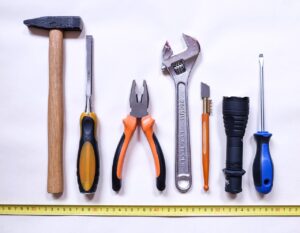Measuring Our Woes by the Ukraine

Interesting how much relevance Ukraine assumed on the U.S. national stage after Russia’s late-February invasion. Suddenly everyone started flying yellow-and-blue flags.
It has also become a one-word comparison for complaints, major or minor.
Think inflation is bad? Ukraine.
Worried about gas prices? Ukraine.
Grieving over the social setbacks of the pandemic? Ukraine.
Yes, we could have it worse.
I got to thinking recently about the relativism of problems while reading one of my favorite columnists, Andrée Peterson.
Titled “Things that fall away,” her column began: “The people in Mariupol running for shelter clutching babes in their arms don’t worry about their bank accounts.”
Nothing Left to Lose
Peterson drew her own picture of woes, particularly losing large sums of money because of unlucky investments, foolish insurance decisions, unexpected hospitalizations or inflation.
“But a funny thing happened on the other side,” she wrote. “I felt free. There was nothing left to lose now.”
She listed other examples, such as her aging father’s insistence on diet soda fading to a “regular’s fine” once his failing heart forced him into hospice care.
Plus, when she asked her father’s doctor if Dad needed to keep up with his smorgasbord of daily meds, the physician looked at her with eyes that said, “Seriously?”
I especially enjoyed her comment about being on a luxury ship five minutes after hitting an iceberg.
At first people are annoyed when the captain announces bocce ball is canceled for the afternoon. Then they complain about all the money spent on this cruise and talk of demanding a refund once back home. A few dour announcements later and “you will give everything you own not to die.”
First-World Problems

I’ve never forgotten the phrase he used that day regarding the situation: First-world problems.
I could relate to such a fix. A few years before his woe, we woke up one New Year’s Day with our refrigerator warm and leaking water from the water/ice dispenser. Something had to be done immediately.
Since this was also at the dawn of the 2007-sparked recession that saw my income decline for four consecutive years, buying a new refrigerator wasn’t on our list of priorities.
Not wanting to add any more debt to our household budget, we raided the fund we had accumulated for another purpose and paid cash for the lowest-priced refrigerator available.
After it later died, we learned that buying the cheapest whatever isn’t a wise move if it means quality is lacking.
Washing by Hand
Ironically, our dishwasher died around the same time (and we’ve never replaced it). When my wife mentioned this “calamity” to an old friend, she replied with a scoff, “Now you can find out how the rest of us live.”
We did, ever since washing dishes by hand and being content to wait to replace the appliance. Besides, washing dishes by hand was a daily ritual when I was growing up. My parents never had a machine during their lifetimes.
I can imagine millions in Ukraine being overjoyed by the simple thought of being able to enjoy a peaceful dinner, followed by a dish-washing routine.


